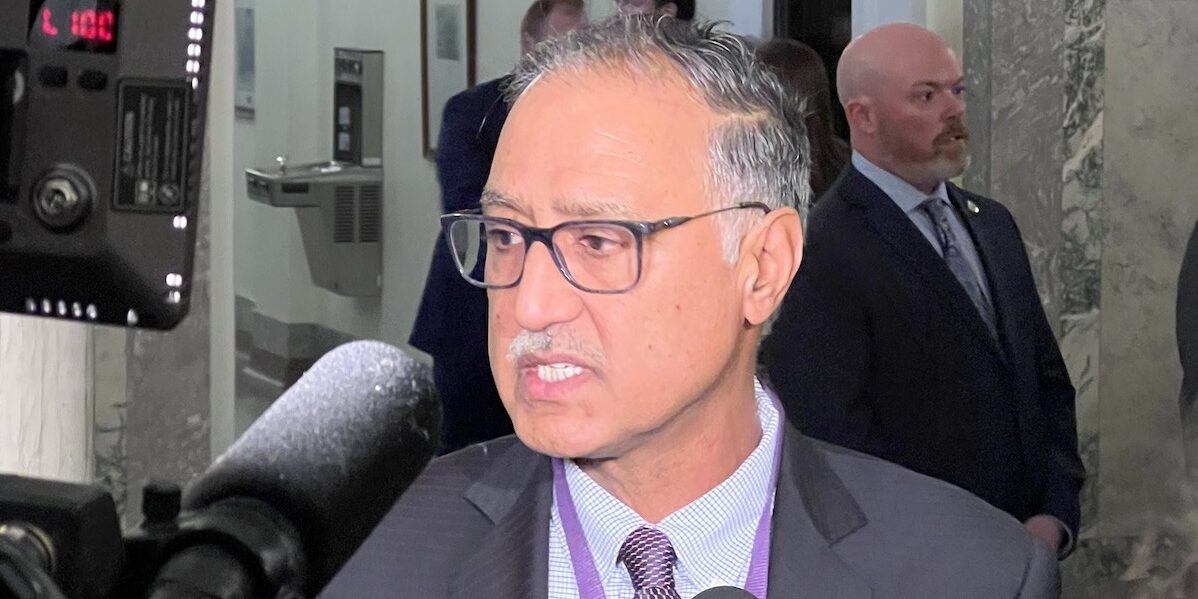Having announced Monday it would spend $9 million cooking up a fanciful provincial railway “masterplan” that includes a public transit component, the United Conservative Party (UCP) informed Edmonton and Calgary it is ending its contribution to their low-income transit pass programs.
The mayors of both cities appear to have been gobsmacked by the unexpected notice they received of cuts of $9 million to Edmonton and $6.2 million to Calgary for the subsidized transit passes for seniors, students and residents living in poverty, which the government did not bother to announce to the public.
City officials ought not have been surprised. The cuts are both vindictive and calculated, and as such, were entirely predictable.
Edmonton Mayor Amarjeet Sohi, posting on the social media platform previously known as Twitter, said far too politely that “at a time when Edmontonians are struggling to afford their basic needs and demand for this program has increased 150 per cent since 2016, the decision to defund this program in Edmonton and Calgary shows that the Province’s priorities are in the wrong place.”
“This program has been incredibly successful,” he said in the short tweet thread. “It reduced stress, removed barriers to transportation and reduced social isolation for program participants. Over 250,000 Ride Transit Program passes were sold in 2023, an increase of approximately 20 per cent from 2019.”
Calgary Mayor Jyoti Gondek struck a tougher note. “I have been informed that the Government of Alberta is slashing funding for the Low Income Transit Pass in the midst of an affordability crisis,” she said in a statement given to media. “I am appalled.”
In a tweet thread, Mayor Gondek said “this provincial government continues to burden big cities by walking away from their commitments. … Rather than spend $6.2 million to help low-income Calgarians and seniors get around now, this provincial government would rather spend more time dreaming about private-public partnerships for trains decades from now.”
Like Mayor Sohi, Mayor Gondek noted that the 119,000 passes issued in Calgary by the end of March this year enable “Calgarians to travel around the city to attend medical appointments, work and school.”
“This is a much needed and well-used program that provides transit access to Calgarians living below the poverty line,” she said. “It is an insult to the lowest income Calgarians who are already struggling to get by.”
Of course, none of these things are necessarily seen as benefits by Smith, her close political advisors, or the party’s rural-dominated caucus in the Legislature, not to mention its MAGA base.
Nevertheless, it’s quite possible the poor are merely collateral damage in Premier Danielle Smith’s buildup to a fiscal and political war on Edmonton and Calgary.
No sooner had the mayors responded to the announcement, than both were attacked on social media by what appeared to be Conservative bots.
Edmonton and Calgary have found themselves in the UCP’s crosshairs of the government for two reasons:
First, electors in both cities have the habit of electing too many progressive councillors for the UCP’s taste, and the party’s strategy of dealing with any electoral threat is to engineer a conflict with someone to shore up the party’s base and punish and provoke its enemies.
Readers will recall that in a conversation with Calgary Sun columnist Rick Bell before the 2023 election, Smith boasted that she didn’t need to win more than 10 or 15 seats in the big cities to form a government.
And, sad to say, punishing cuts for Edmonton and Calgary might well turn out to be politically popular in rural Alberta.
After the election, the premier told the annual Canada Strong and Free Network clambake in Ottawa that Conservatives needed to find a way to win the hearts of voters in big cities. Commentators might have imagined this would mean the UCP would adopt a kinder, more generous approach to Alberta’s cities.
Most wouldn’t have guessed, though, that instead the party would adopt a strategy of making it as hard as possible for city councils to run their cities while introducing municipal political parties in hope voters could be stampeded to support the UCP’s Edmonton and Calgary farm teams.
And if that doesn’t work, the UCP can always use the power it is giving itself to fire city councillors in absentia after a short, secret cabinet hearing.
Edmonton Journal columnist Keith Gerein summed it up nicely: “UCP plan seems obvious at this point. Defund cities to increase misery, blame it on the councils, restrict their ability to take recourse, tell voters that parties will fix everything, and if that fails, give yourself the power to remove councillors and revoke bylaws.”
The second reason Smith is ginning up a Special Municipal Operation, as it were, is that the UCP’s war with the Trudeau Government will have to end soon if Pierre Poilievre becomes the prime minister.
Could the Smith Government even function without a Main Enemy to attack every time it encountered difficulties with its own policy prescriptions?
Well, no one is ever going accuse Ms. Smith of being a premier for all Albertans! Least of all folks in Edmonton who elected a mayor who used to be a federal Liberal cabinet minister.
No, this is a party in the mold of MAGA Republicans south of the Medicine Line, who divide to conquer and enjoy watching the pain they cause. The cruelty is often the point.
A statement to media from the press secretary to Seniors, Community and Social Services Minister Jason Nixon touted provincial funding for homeless shelters and blew off complaints about the surprise cuts on the grounds “transit is a municipal responsibility in the two big cities.”
However, Alexandru Cioban did say that “Alberta’s government is investing $5 million to support transportation programs for low-income Albertans in rural communities where transportation options are limited.”



